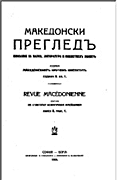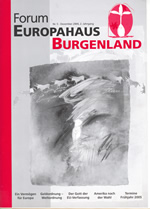



Keywords: Bulgaria during the 10th Century; Tzar Roman; Tzar Samouïl; Komitopoulkos; Vassilii II.;
V.N. Zlatarsky's essay on the Bulgarian history of the late 10th century stretches over two issues of M.P. The author examines historical sources about the era, when Bulgaria had been divided into an Eatern part (under Byzantine domination) and a Western realm which remained independent. This territory comnprised the region which we know today as Macedonie, South Albania, the Epirus mountains and Western Misia and its independence resulted from the urpise of Bulgarianb Boyards in 969 lead by the four brothers David, Moïs, Aaron and Samouïl. Zlatarsky focuses on the politics of Vassilii II., emperor of Byzanz, his attempts to reconquer the Westenr part of Bulgaria until the time, when Komitopoulos proclaimed himself Tsar of the Bulgarians.
More...





Ein Vermögen für Europa Zwischen Selbstbestimmung und Obrigkeits“vertrauen“ Vier Fragen an die BürgerInnen: von Thomas Mann Seite 2 Networking European Citizenship Education Ein Bericht von einer europäischen Konferenz in Santiago de Compostella von Hans Göttel, Interview mit Monika Oels Seite 5 Heimat als Bildungsfrage Brigitte Kühne Seite 8 Die Einladung, da zu sein... Bibliotheken in Finnland von Hans Göttel Seite 9 Geldordnung – Weltordnung Ein Rückblick auf eine Veranstaltungsreihe mit dem Welt-Laden im „Haus Eisenstadt von Peter Winkler Seite 10 Was macht das Geld mit dem Menschen? von Hans Raimund Seite 12 Geld macht Hunger von Gustav Kramer Seite 14 Wieviel Globalisierung verträgt der Mensch? Eine Buchempfehlung Seite 15 Der Gott der EU-Verfassung Eine Analyse von Ulrich Duchrow Teil II Seite 16 Menschen- und Frauenhandel seit der EU-Erweiterung von Sabine Stadler Seite 19 Amerika nach der Wahl Vom Alkoholiker zum Apokalyptiker von Stephan Mögle Stadel Seite 21 Good bye, America von Ekkehard Krippendorff Seite 23 Willkommen im Europahaus Termine Vorschau 2005 Seite 24 Publikationen Impressum
More...
Keywords: prasa ogólna; język; pole tematyczne; słownictwo; prasa dla młodzieży
In the article, the author discusses several important newspapers’ features which are of a special value to a linguist. It has been pointed out that newspapers are an irreplaceable source to the studies of thematic fi elds and lexical layers (special, vernacular, environmental). Particular attention has been paid to the process of borrowings’ polonization, especially Anglo-American. The most striking feature of the newest and latest borrowings excerpted from the press and Internet texts is their level of spelling variance. Press texts which shape public opinion through announcing and explaining current events and phenomenons, give linguists the ability to work out and improve study methods of text function, especially limits among their informative, persuasive and manipulative function. Trans. A. Gierba
More...
In dictionaries people rarely search for ideological or world-views essence. The research on sex stereotypes in Nowy słownik poprawnej polszczyzny PWN shows that examples of word usage can be a very rich source material to this kind of analysis. In the article I tried to prove that stereotypic perception of a man and a woman and their roles in a family is still deeply ingrained in people’s thinking – even now when it is signifi cantly different from reality. Examples from the dictionary show that a woman’s domain is her private sphere and a man’s a public one. It is simplifi ed and somewhat misrepresented view of the world. Admittedly, one cannot expect from dictionaries to fi ght with stereotypes because that is not their role, but it is good to be aware of such a problem and try to minimalize it. I have reached for content and discourse analysis i.e. for methods from linguistics and social studies. They enable to study short, separate utterances as a uniform narration and show that there emerges a coherent, surprising linguistic portait of differencies between women and men. Trans. A. Gierba
More...
Keywords: słownictwo i frazeologia profesjonalna; gwara środowiskowa; słownictwo i frazeologia nieprofesjonalna; ekspresywne jednostki leksykalne; wspinacze skałkowi; alpiniści
Research in the ways of language communication within rock-climbers community, has led to distinguish and describe functions of different vocabulary groups. The semantic and formal analysis of lexems and idioms in climbing dialect demonstrated that this local dialect develops on the boundary – it is partly environmental and partly professional. The aim of the research was to show the opposition of professional and non-professional vocabulary in rock-climbers’ dialect and to show professional lexis in nominative and communicative function and non-professional lexis in emotive function. The linguistic material was derived from spoken and written texts. The written texts come from Internet fora, websites of mountaineering clubs and subject literature whereas the spoken texts were gathered during talks with climbers. Trans. A. Gierba
More...
Keywords: proces metaforyzacji; kontekst; przenośnia; neosemantyzmy środowiskowe; paralotniarze
The subject of the article are semantic neologisms present in paragliders’ sociolect, which is an example of new environmental variation of the Polish language. The author analysed noun semantic neologisms, which result from metaphorical use of the words in general language. Many of the described names one can recognize as metaphors yet stabilized, which are often the only defi nitions for objects and phenomenons. In case of some words, one can notice that the metaphorical process has not fi nished yet and can observe its transitory stage which precedes a complete record of a new meaning. Trans. A. Gierba
More...

Keywords: serwis aukcyjny; komentarz językowy; sposoby wyrażania negatywnych emocji; funkcja ekspresywna; funkcja impresywna
The researches concerning Internet communication are methodologically located in psycholinguistics and pragmatics. The article describes linguistic ways of expressing nagative emotions by auction service „Allegro” users. The first part of the text was sacrifi ced to reasons which cause the appearance on service’s websites texts expressing emotions like dissatisfaction, sadness or anger. The second part of the paper deals with the ways of expressing these emotions by Internet users. The author analyses negative vocabulary which serves to deprecate an interlocutor and the ways of using imperative and infi nitives in persuasive function. The special attention was paid to specifi city of text record, especially to the use of capital letters and multiple use of punctuation marks.
More...
Keywords: słowo miszmasz; Słownik warszawski; Słownik języka polskiego Doroszewskiego; M. Bańko; Słownik ilustrowany języka polskiego Michała Arcta
More...
Uwagi o nauce o języku w podstawie programowej z 2009 r., Sprawozdanie z Międzynarodowej Konferencji Naukowej Dysleksja w wieku dorosłym – Gdańsk, 28–29 listopada 2009 r., Sprawozdanie z promocji portalu Gwary polskie. Przewodnik multimedialny pod red. Haliny Karaś(www.gwarypolskie.uw.edu.pl)
More...
The present study is based on social cognition approach on stereotypes, that they are categorical information shortcuts. Using an experimental methodology (306 participants), our study was aimed to reveal the impact of ethnic stereotypes activation on the quantitative informational treatment of the same text. We measured the congruence of subjects' evaluation. Our dependent variable was significantly influenced by ethnic label despite cotextual factors that were also manipulated. The point of interest of our study is identification of variability patterns of subjects' congruence and the condition that influence it.
More...